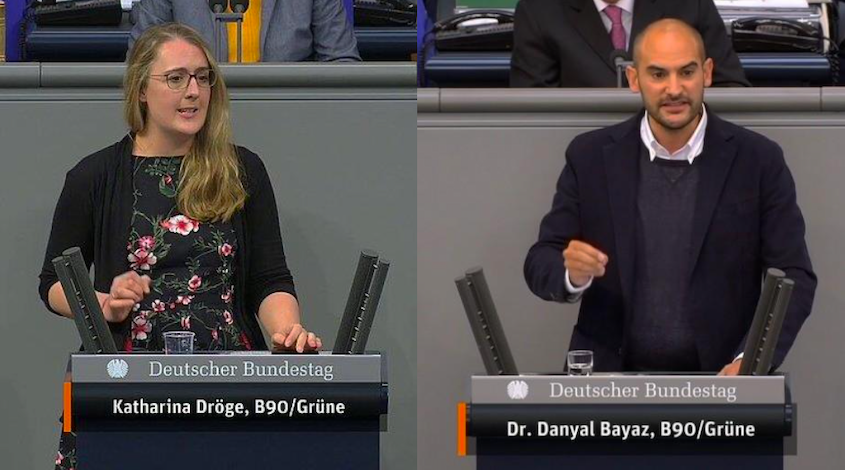
Bundestag Parlamentsfernsehen
The Future of Transatlantic Trade Relations

Danyal Bayaz
Member of the German Bundestag (Alliance 90/The Greens)
Danyal Bayaz, Ph.D, has been a member of the German Bundestag since 2017 and serves as spokesman for startups in the parliamentary group of the Greens. He is a member of the Finance Committee, Green Chairman of the Wirecard investigative committee and a sub member of the Digital Agenda, the Economy Committee, and the expert commission on artificial intelligence. Danyal studied Politics and Economics and received a Ph.D. from the University of Stuttgart-Hohenheim. Before joining the Bundestag he was with the Boston Consulting Group as a project leader serving clients from the Public Sector and Financial Markets.

Katharina Dröge
Member of the German Bundestag (Alliance 90/The Greens)
Katharina Dröge has been a member of the Bundestag since 2013 and is the Parliamentary Spokesperson on Economic Policy for The Greens. She grew up in the small town of Ladbergen in North Rhine-Westphalia and has a degree in Economics from the University of Cologne. She has also since 2014 been a member of the advisory board of the Federal Network Agency for Electricity, Gas, Telecommunications, Post and Railways, Bonn. Katharina Dröge is also a member of the Parliamentary Advisory Board of the World Population Foundation; British-German parliamentary group of the German Bundestag; Amnesty International; Association of Friends and Supporters of the Cologne Child Protection Association; Terre des Femmes; Old Cologne Carnival Society “Schnüsse Tring” 1901 eV.
Former U.S. President Donald Trump pursued an aggressive, winner-take-all international trade policy. He pushed protectionism and punitive 232 tariffs, blocked the WTO dispute settlement mechanism, and both threatened and implemented sanctions. This approach forced EU trade policy with the United States to focus primarily on stalling Trump’s plans and buying time. Actively shaping trade relations and new ideas took a back seat.
That has changed with new U.S. President Joe Biden. Not all areas of controversy will suddenly disappear, especially since President Biden will invest a lot of energy in overcoming the political division in the United States and the consequences of the pandemic. But some things may change for the better now.
During his presidency, there could once again be room for joint trade policy projects, the revival of multilateral structures, and the discussion of progressive ideas. Progress can be made in concrete areas such as sectoral industry agreements with tariff reductions and cooperation on technical standards in combination with joint climate protection efforts.
Calls for a new TTIP are unrealistic both in scope and content. Instead of a highly controversial mega-agreement, agreements in targeted sector-specific areas are much more promising.
Calls for a new TTIP are unrealistic both in scope and content. Instead of a highly controversial mega-agreement, agreements in targeted sector-specific areas are much more promising.
The EU and the United States also need an honest assessment of why the TTIP negotiations failed. Differences over European and American agricultural interests and European issues regarding access to U.S. procurement markets already existed during the Obama presidency and are still present today.
At the time, Alliance 90/The Greens criticized the TTIP negotiations on various fronts. These included the lack of transparency in the negotiations, the problematic investor-state dispute settlement procedures, the design of regulatory cooperation, and poor safeguarding of environmental and consumer protection in the agreement. We will continue to measure all trade agreements against these specific benchmarks.
Biden’s program on trade policy has not yet been clearly outlined. But it is already clear that the “Buy American” line in particular will be a guiding principle. In his first days in office, Biden already launched a Buy American executive order, a point he re-emphasized in his 100 day speech before Congress. Concluding new trade agreements, on the other hand, is not likely to be his top priority. He is unlikely to return to Obama’s trade policy, which consistently sought the conclusion of new agreements, particularly comprehensive ones like TTIP and TPP, as part of the Obama administration’s strategy to contain China.
It is also unclear to what extent Biden will roll back Trump’s trade policy measures, such as punitive tariffs. For example, 232 tariffs on European aluminum and steel remain in place. Against this backdrop, it makes more sense to focus on progressive agreements in sub-areas with common interests. This applies in particular to climate policy.
Linking trade policy and climate protection is a great opportunity for transatlantic trade relations. Successful cooperation in this area can make the value of international cooperation tangible and thus spill over into other trade policy fields.
Linking trade policy and climate protection is a great opportunity for transatlantic trade relations. Successful cooperation in this area can make the value of international cooperation tangible and thus spill over into other trade policy fields.
Under Joe Biden and Kamala Harris, the United States has already raised the profile of climate policy to a top priority issue. Accordingly, the United States returned to the Paris climate agreement on the first day of Biden’s presidency, advocated that trade agreements must reduce CO2 emissions, and appointed John Kerry as a cabinet-level Climate Envoy. The European Commission recently announced that the Paris climate agreement should be a so-called essential element of all new trade agreements in the future. On this basis, several projects can be identified that pursued jointly with the United States.
Biden is in favor of imposing a surcharge on climate-damaging products at external borders. The European Commission is also planning a CO2 border adjustment system as part of its Green Deal. Joint development and implementation of climate tariffs would have a major signaling effect. If Biden also introduces a CO2 pricing regime, alignment of the systems could be considered in the long term.
The United States and Europe must combine their global heft to jointly shape a fair and rules-based global economic order. Together they can set standards that even China cannot ignore.
The United States and Europe must combine their global heft to jointly shape a fair and rules-based global economic order. Together they can set standards that even China cannot ignore.
A window of opportunity is opening to work with the United States to reinvigorate multilateral organizations and rules-based conflict management. A first step is that WTO leadership has finally been settled now that the United States under President Biden has supported the new WTO Director General Okonjo-Iweala.
A next step must be jumpstarting the WTO Appellate Body. Longer-term projects in the common interest of the EU and the United States could be the development of new WTO rules on government subsidies and their review, a standardization agenda, the anchoring of the Paris climate change agreement, and further reform processes in the WTO rulebook.
On traditional trade issues, Biden’s interests are not yet clear. The EU should first offer to him—linked to cooperation on climate protection—to conclude tariff reduction agreements in certain areas and to deepen joint technical standard setting. The conformity assessment recognition agreement already negotiated under Trump may also be a possibility under certain conditions.
The temporary, mutual suspension of tariffs in the conflict over subsidies for Airbus and Boeing is a good first sign. The goal for the coming months must be a long-term solution to the conflict.
Trade cooperation can have positive spill-over effects on other economic and financial policy areas that also urgently need more cooperation and renewal—from rules for digital technologies, protection of data access, to a sustainable finance architecture with standards for a green financial market, to fair taxation in the digital age.
Trade cooperation can have positive spill-over effects on other economic and financial policy areas that also urgently need more cooperation and renewal—from rules for digital technologies, protection of data access, to a sustainable finance architecture with standards for a green financial market, to fair taxation in the digital age.
The U.S. administration has already reversed Donald Trump’s obstructionist stance and made its own proposals for a global minimum corporate tax. This is a unique chance to make international tax evasion more difficult.
The Covid crisis also offers quick wins for transatlantic cooperation. The EU, together with the United States, should take the initiative to establish a task force at the G20 level to bring together all capacities of the global pharmaceutical industry and bring more fairness and equity to global crisis management. This task force should support and complement existing tools such as COVAX and the Technology Access Pool. Here lies a great opportunity and commitment for new transatlantic cooperation with the Biden administration.
Differences will continue to exist. One thinks, for example, of the specific rules for taxing digital corporations. Also, the U.S.-China dispute over global technology leadership will remain and pose an ongoing challenge to the EU. But there are obvious areas where Europe and the United States can set standards in their common interest that can serve as a model for other regions and offer common global perspectives.
Katharina Droege has been a member of the German Bundestag since 2013 and serves as Spokeswoman for Economic Policy in the parliamentary group of the Greens.
Danyal Bayaz has been a member of the German Bundestag since 2017 and is Head of the Economic Advisory Board in the parliamentary group of the Greens.








